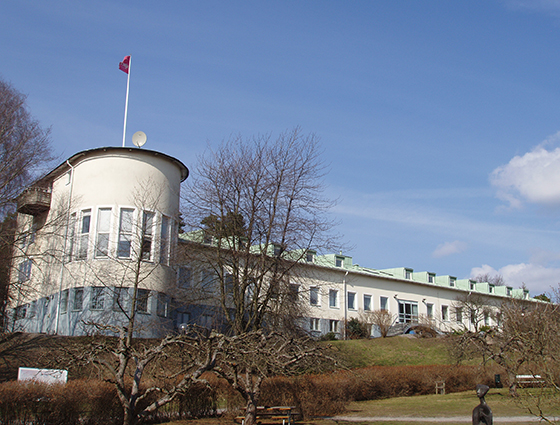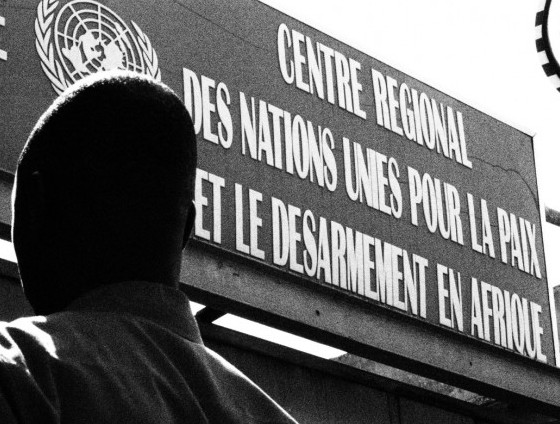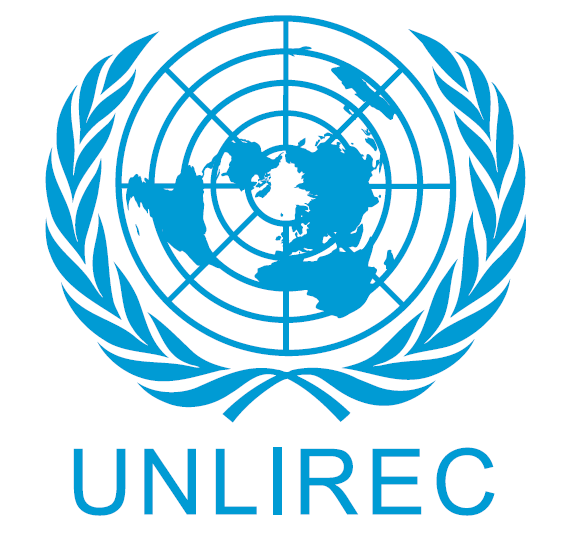Purpose of the website
The international community has built and continues to maintain a comprehensive set of international treaties, guidance and reporting instruments in the fields of arms transfers and small arms and light weapons (SALW) controls. The two most important instruments in this regard are the 2001 UN Programme of Action on SALW (UN POA) and the 2013 Arms Trade Treaty (ATT). Combined, these instruments detail the key systems that states should have in place in order to exercise effective control over the manufacture, storage, sale, transfer and disposal of conventional arms and SALW.
In recent years, a significant number of cooperation and assistance activities have been carried out with the aim of helping states to establish or improve their arms transfer and SALW controls. The entry into force of the ATT led to the funding of a range of new efforts in these areas. Many of these activities are focused on helping states to implement either the UN POA or the ATT. Others are aimed at building capacity in arms transfer and SALW controls but make no direct reference to these instruments.
The wider range of activities and the large number of implementing organisations can make it hard for those engaged in this area to coordinate their efforts and be aware of all the work that is taking place. This can lead to gaps in coverage, duplication of effort and further stress on limited financial resources
SIPRI’s Mapping ATT-Relevant Cooperation and Assistance Activities database was developed in order to help address this issue. It aims to provide states, NGOs, regional and international organizations with information about arms transfer- and SALW control-related cooperation and assistance activities and related guidance documents. The aim of the database is to allow these stakeholders to carry out joint work and avoid duplication of effort when planning and implementing cooperation and assistance activities.
The activity database
A cooperation and assistance activity is a targeted effort—generally a training event, workshop, roundtable meeting, seminar or conference—aimed at building a state’s national capacities in particular aspect of arms transfer and SALW controls. They generally involve one or more partner states, which benefit from the activity, implementers, which carry it out, and donors, which provide the funding. Implementers and donors may be NGOs, states or international or regional organisations. In certain cases, a partner state may also be an implementer or donor in the same activity. For example, states sometimes play a direct role in implementing or funding an activity in which they are also a partner.
The activity database currently includes information about arms transfer and SALW control-related cooperation and assistance activities involving partner states from Africa, East Asia, South East Asia, Latin America and the Caribbean, and the Middle East since 2012. The information about activities involving partner states from Latin America and the Caribbean is available in English and Spanish. SIPRI aims to expand the coverage of the database to include other regions in the near future.
Each activity is given an individual page, which contains information about:
• what the activity involved;
• any larger project of which the activity was a part;
• the activity’s type, focus, partner states, implementers, donors and budget;
• links to any websites detailing the activity;
• links to other closely related activities in the database; and
• contact details for the implementers.
The activities are tagged and searchable according to their type, focus, partner states, implementers, donors, region and subregion.
The four ‘type’ tags are:
• ‘Sensitization and outreach’ - Building awareness among governments, parliamentarians or NGOs about issues related to arms transfer or SALW controls.
• ‘Legal or legislative assistance’ - Reviewing, amending or drafting legislation or regulations related to arms transfer or SALW controls;
• ‘Institutional capacity building’ - Strengthening administrative capacities among the national authorities responsible for arms transfer or SALW controls.
• ‘Technical, material or financial assistance’ - Providing: (a) technical experts for training activities or longer-term secondment; (b) equipment and software for record-keeping, marking, detection and other relevant uses; or (c) institutional funding or direct budgetary support in areas relevant to arms transfer or SALW controls.
The ‘focus’ tags include issues that concern establishing and implementing an effective system of arms transfer controls and which relate to the main obligations contained in the ATT. These are:
• ‘Transfer controls’ – Establishing or improving an arms transfer control system;
• ‘Control list’ – Establishing or improving the list of controlled goods;
• ‘Risk assessments’ – Establishing or improving systems for assessing any risks associated with a transfer;
• ‘Import controls’ – Establishing or improving controls on imports;
• ‘Transit and trans-shipment controls’ – Establishing or improving controls on transit and trans-shipment;
• ‘Brokering controls’ – Establishing or improving controls on brokering;
• ‘Border controls’ - Establishing or improving border and/or customs controls; and
• ‘Reporting on arms transfers’ – Establishing or improving systems for collecting and reporting information on arms transfers or the control system itself.
The ‘focus’ tags also include issues that concern establishing and implementing an effective system of SALW controls and which relate to the main obligations contained in the UN PoA. These are:
• ‘Small arms and light weapons (SALW) controls’ - Establishing or improving a system of SALW controls;
• ‘Inventory and stockpile management’ – Establishing or improving systems for managing SALW stockpiles;
• ‘Marking’ – Establishing or improving systems for marking SALW;
• ‘Record-keeping’ - Establishing or improving systems for maintaining records on the production, storage or disposal of SALW;
• ‘Tracing’ – Establishing or improving systems for tracing the origin of illicit SALW;
• ‘Ammunition’ - Establishing or improving controls on the production, storage or disposal of SALW ammunition;
• ‘Destruction’ - Establishing or improving systems for safely disposing of unsafe or surplus of SALW; and
• ‘National action plan (NAP)’ - Establishing or improving national action plans (NAPs) as required under the UN Programme of Action on SALW.
The ‘focus’ tags also include issues that relate to both arms transfer and SALW controls. These are:
• ‘Diversion’ - Establishing or improving systems aimed at preventing the diversion of conventional arms or SALW to non-authorised end-users or end-uses;
• ‘Gender based violence (GBV)’ - Establishing or improving systems aimed at preventing instances of gender-based violence (GBV);
• ‘Enforcement’ - Establishing or improving systems of investigating and prosecuting violations of arms transfer or SALW controls;
• ‘International instruments’ – Implementing international instruments related to arms transfer and SALW controls, such as the ATT and the UN POA;
• ‘Regional instruments’ – Implementing regional instruments related to arms transfer and SALW controls, such as the CIFTA and ECOWAS Conventions;
• ‘Regional cooperation’ – Establishing or improving systems of regional cooperation among states on issues relating to arms transfer and SALW controls.
Please note that the activities included in the activity database vary significantly in terms of their scale and content. Some activities lasted one day while others lasted several weeks or years. Some activities had one partner State while others engaged with all States from a particular sub-region or region. Also, for the sake of brevity, some sets of connected activities – particularly ones focused on issues relating to SALW controls more generally – have been condensed into a single entry. In addition, the database does not claim to be comprehensive but illustrative, and there are likely to be many activities - particularly ones focused on issues relating to SALW controls more generally – that are not included.
Finally, it is likely that there are errors in the activity database. When compiling the database we have relied on information published by the implementer or provided by the implementer to SIPRI. However, this information has not been independently verified. For example, if a published report about an activity mentions participation by all states in Latin America and the Caribbean, then all states in the region will be listed as partner states. Independently verifying whether all the states actually participated in the event was beyond the scope of the mapping effort.
For these reasons, we advise caution when using the activity database. The database is of greatest value as a qualitative tool for understanding the overall content, type and focus of cooperation and assistance activities that have taken place involving partner states from the regions covered. It should not be used to make an assessment of the impact that these activities have had on the partner sates involved since this is beyond the scope of this instrument.
We also welcome any and all input concerning corrections, improvements and additions to the activity database. The website hosts a feedback tool, allowing users to send suggestions for improvements to the activity database. It also hosts a submission tool, allowing users to submit information about activities that should be included in the activity database.
Document database
The document database contains guidelines, model laws, regional and international instruments, and other material that may be of assistance to states as they seek to maintain or improve their arms transfer and SALW controls, as well as documents produced in connection with the activities in the activity database. Documents in the database are tagged and searchable according to their year of publication, publisher, ‘type’ and ‘focus’.
The ‘type’ tags are:
• ‘Activity reports’ - Implementation reports, impact assessments and other documents connected to the activities in the activity database;
• Guidelines’ – Guidelines showing states how to create legislation and regulations on arms transfer and SALW controls in ways that are in line with relevant international and regional instruments.
• 'International instrument' – International instruments related to arms transfer and SALW controls, such as the ATT and the UN PoA on SALW;
• 'Regional instrument' - Regional instruments related to arms transfer and SALW controls, such as the CIFTA and ECOWAS Conventions;
• 'Model law or regulation' – Templates showing states how to create legislation and regulations on arms transfer and SALW controls that is in line with relevant international and regional instruments; and
The ‘focus’ tags are the same as those used in the activity database (see above).

SIPRI is an independent international institute dedicated to research into conflict, armaments, arms control and disarmament. Established in 1966 and based in Stockholm, SIPRI provides data, analysis and recommendations, based on open sources, to policymakers, researchers, media and the interested public. SIPRI is regularly ranked among the most respected think tanks worldwide.
SIPRI's vision is a world in which sources of insecurity are identified and understood, conflicts are prevented or resolved, and peace is sustained.
SIPRI’s mission is to:
- undertake research and activities on security, conflict and peace;
- provide policy analysis and recommendations;
- facilitate dialogue and build capacities;
- promote transparency and accountability; and
- deliver authoritative information to global audiences

UNREC was established in 1986 pursuant to General Assembly resolution A/Res/40/151/G, following a request made at the Assembly of Heads of States and Government of the Organization of African Unity. UNREC is mandated to provide, upon request, substantive support for initiatives and other efforts of Member States of the African region towards the realization of measures of peace, arms limitation and disarmament in the region, in co-operation with the African Union. For additional information visit www.unrec.org.
SIPRI developed this website in cooperation with the United Nations Office for Disarmament Affairs through its Regional Centre for Peace and Disarmament in Africa (UNREC).
Some resources or data listed and/or hyperlinked on these pages may be from individuals, organizations and entities other than the United Nations and are provided for information purposes only. The provision of such resources, data or hyperlinking is not an endorsement by the United Nations of the views expressed therein nor does the United Nations have control over the content or accuracy of information provided. No editorial comment is implied by the omission of a resource, data or website.

The United Nations Regional Centre for Peace, Disarmament and Development in Latin America and the Caribbean (UNLIREC), headquartered in Lima, Peru, was created by a UN General Assembly resolution in 1986. UNLIREC was created to support 33 Latin American and Caribbean States in their implementation of peace and disarmament measures and promotion of economic and social development. It is also tasked with applying all mandates related to disarmament, arms control, and non-proliferation given to it by UN Member States. UNLIREC is the only UN regional entity specialized in disarmament and non-proliferation in the region. In short, its main function is to translate the decisions, instruments and commitments of Member States in the field of disarmament and non-proliferation into action. For additional information visit http://www.unlirec.org
SIPRI expanded this website to cover Latin America and the Caribbean in cooperation with UNLIREC.
Some resources or data listed and/or hyperlinked on these pages may be from individuals, organizations and entities other than the United Nations and are provided for information purposes only. The provision of such resources, data, or hyperlinking is not an endorsement by the United Nations of the views expressed therein nor does the United Nations have control over the content or accuracy of the information provided. No editorial comment is implied by the inclusion or omission of a resource, author, publisher, data, or website.




